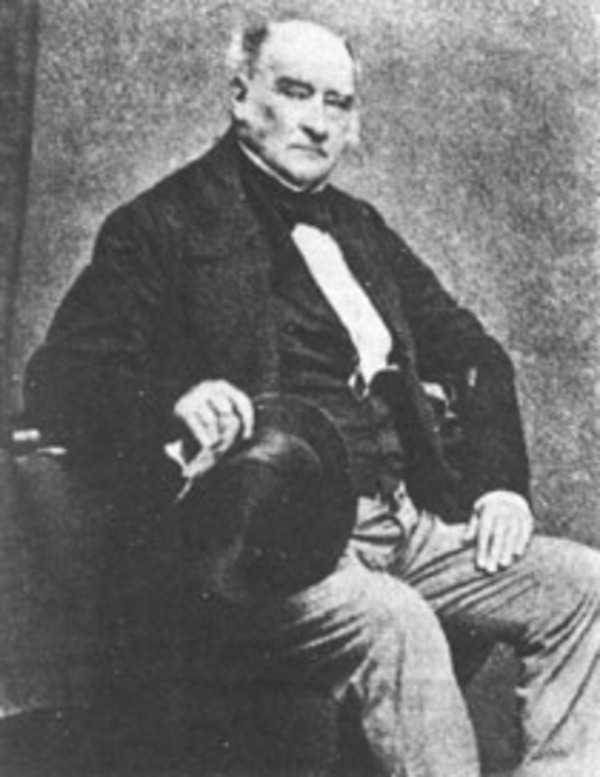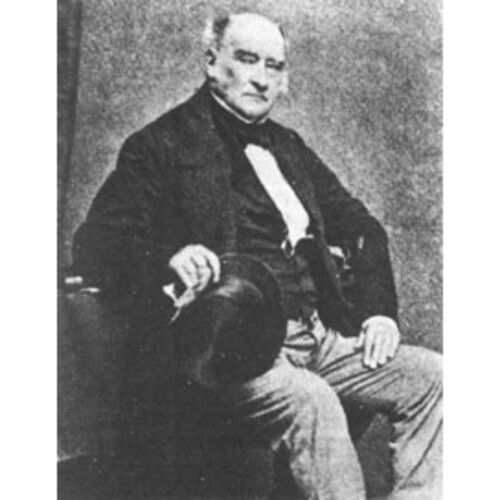
Source: Courtesy of Wikimedia Commons
OGDEN, CHARLES RICHARD, lawyer, politician, and public servant; b. 6 Feb. 1791 in Quebec City, one of 11 sons of Isaac Ogden, loyalist and puisne judge of the Court of King’s Bench at Montreal, and Sarah Hanson; m. first, at Walcot, Somerset, England, in July 1824, Mary Aston, daughter of General John Coffin*, and they had two children, both of whom died at an early age; m. secondly, at Montreal in August 1829, Susan, daughter of Isaac Winslow Clarke, deputy commissary general at Montreal, and they had four sons and a daughter; d. 19 Feb. 1866 at Edge-hill, near Liverpool, England.
Charles Ogden received his earliest education at the school of the Reverend John Doty in Trois-Rivières, thereby establishing, apparently, his initial contact with that town. He completed his education in Montreal under the noted schoolmaster Alexander Skakel*. Upon being called to the bar on 21 Feb. 1812, Ogden established his practice at Trois-Rivières but in a few years returned to Montreal where he formed a widely respected and lucrative law partnership with Alexander Buchanan*. During the War of 1812 he served an undistinguished term as lieutenant with the 1st battalion, then with the 8th, of the militia division at Trois-Rivières.
In May 1814 Ogden commenced a political career with his election to the House of Assembly for Trois-Rivières. Although a Tory, he represented this largely French Canadian constituency almost uninterruptedly for the next 19 years, by means of the tight control over local politics wielded by his supporters among the merchants, combined with the force of his own personality. His only electoral defeat occurred in 1824 while he was absent in England; he easily regained the seat in the contest of 1826.
A man from a prominent family, a successful lawyer and politician, Ogden early attracted official favour: an appointment as kc in 1816, as attorney general for the district of Trois-Rivières in 1818, and six years later, at the urging of Governor Dalhousie [Ramsay*], as solicitor general of Lower Canada. During the 1820s, when government candidates were virtually swept from the assembly, Ogden remained, representing, as one historian has claimed, “the advance guard of the Montreal party,” a group which was anathema to the Patriotes.
In 1833 he was appointed attorney general for Lower Canada, and consequently resigned from the legislature in response to the Colonial Office’s request that public officers maintain “a cautious abstinence” from politics. Yet, in the aftermath of the rebellions of 1837–38, Ogden’s participation in events, as an intimate adviser to the hated Governor Sir John Colborne, as chief prosecutor of the arrested “rebels,” as a member, after 1840, of the Special Council, and as provider of an official countersignature, in February 1841, to the proclamation of the union of Upper and Lower Canada, deepened the hostility with which he was regarded by French Canadians at large.
Ogden continued as attorney general for Lower Canada into the union period, complying with the Colonial Office’s new directives by re-entering the political sphere, and successfully contesting the borough of Trois-Rivières in the election of April 1841. He nevertheless bitterly resented the drastic reduction in his salary, from £4,000 to £1,500, and the curtailing, by the government’s removal to Kingston, of his substantial Montreal law practice.
Following the close of the session of 1841, Ogden departed for Europe on a year’s leave. In his absence, the government of William Henry Draper*, of which he was a member, resigned; he returned in 1842 to discover that Louis-Hippolyte La Fontaine had replaced him as attorney general for Canada East. Furthermore, the new Reform administration refused a suggestion that Ogden be offered a government pension. He returned almost immediately to England to seek official redress, probably with the aid of Lord Lyndhurst to whom he was related through his second wife, but without success.
In the spring of 1844, Ogden briefly revisited Canada to settle his affairs; he had been admitted earlier that year to the English bar at Lincoln’s Inn and appointed attorney general of the Isle of Man. In 1857 he accepted the further appointment of registrar of the Liverpool Probate Court. He retained these positions until his death on 19 Feb. 1866.
ANQ-Q, AP-G-196. PAC, MG 30, D62, 23, p.191. Gentleman’s Magazine, CXXXVI (July–December 1824), 176; CCXX (January–June 1866), 753. La Minerve, 23 juill. 1827. Montreal Gazette, 27 March, 7 Dec. 1824; 14 Sept. 1826. Montreal Transcript, 9 April 1844. F.-J. Audet, Les députés des Trois-Rivières (1808–1838) (Trois-Rivières, 1934), 12–17. Ivanhoë Caron, “Inventaire des documents relatifs aux événements de 1837 et 1838, conservés aux Archives de la province de Québec,” ANQ Rapport, 1925–26, 153ff. Desjardins, Guide parlementaire. Notman and Taylor, Portraits of British Americans, III. P.-G. Roy, Les juges de la prov. de Québec, 395. Atherton, Montreal, II, 127. Archie Binns, Peter Skene Ogden: fur trader (Portland, Oreg., 1967). Christie, History of L.C., V. Dent, Last forty years, I, 244. A. E. E. Legge, The Anglican Church in Three Rivers, Quebec, 1768–1956 (Russell, Ont., 1956), 43. Lorenzo Sabine, The American loyalists (Boston, 1847), 219. Helen Taft Manning, The revolt of French Canada, 1800–1835: a chapter in the history of the British Commonwealth (Toronto, 1962), 83, 130. W. O. Wheeler, The Ogden family in America, Elizabethtown branch, and their English ancestry; John Ogden, the Pilgrim, and his descendants, 1640–1906, their history, biography & genealogy, ed. Lawrence Van Alstyne and C. B. Ogden (Philadelphia, 1907).
Cite This Article
Lorne Ste. Croix, “OGDEN, CHARLES RICHARD,” in Dictionary of Canadian Biography, vol. 9, University of Toronto/Université Laval, 2003–, accessed February 20, 2026, https://www.biographi.ca/en/bio/ogden_charles_richard_9E.html.
The citation above shows the format for footnotes and endnotes according to the Chicago manual of style (16th edition). Information to be used in other citation formats:
| Permalink: | https://www.biographi.ca/en/bio/ogden_charles_richard_9E.html |
| Author of Article: | Lorne Ste. Croix |
| Title of Article: | OGDEN, CHARLES RICHARD |
| Publication Name: | Dictionary of Canadian Biography, vol. 9 |
| Publisher: | University of Toronto/Université Laval |
| Year of publication: | 1976 |
| Year of revision: | 1976 |
| Access Date: | February 20, 2026 |



